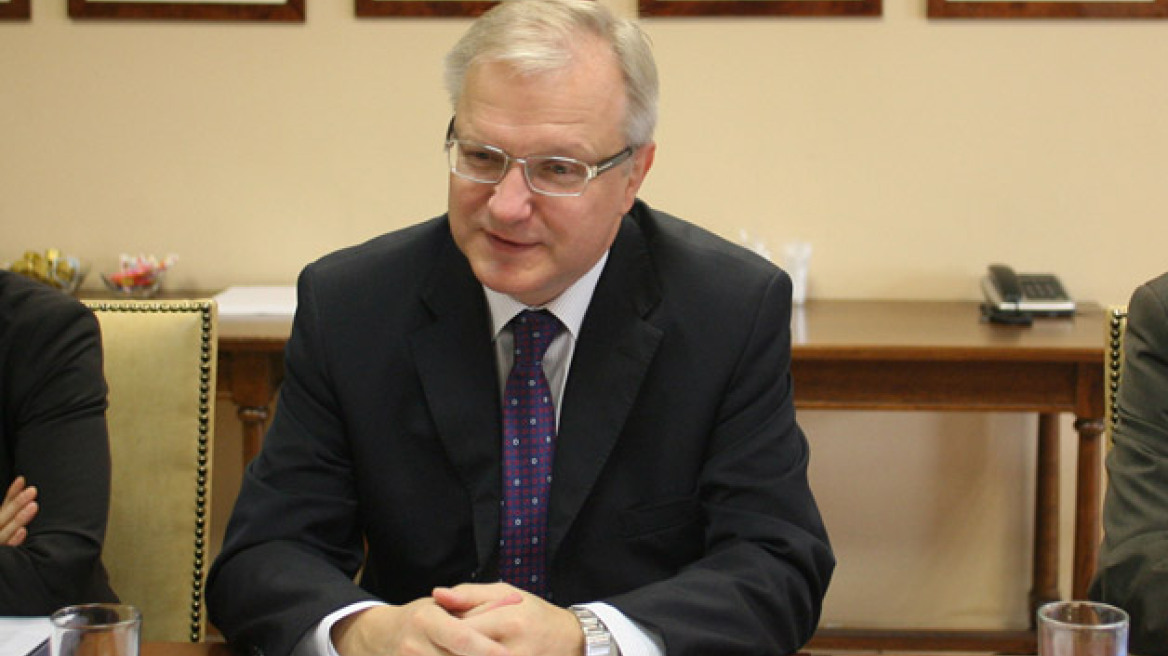
The extension is a carrot on a stick, while the measures keep on whipping
The extension is a carrot on a stick, while the measures keep on whipping
Olli Rehn characterized the Hellenic economy amelioration program as "scary"

UPD:
Olli Rehn, speaking for the European Union and European Commission, expressed his full support for proceeding to the second stage of taking measures, in a meeting with the Minister of Finance, Giorgos Papakonstantinou.
Basically, he predisposed the decision to further the loans provided to Greece, underlining that "with the progress shown by Greece in its applied program, it recovers its accountability towards both its European counterparts and those outside the EU. One indication of that is that the Eurogroup will make a positive decision on the lengthening of loans in the beginning of 2011. This will assuage any fears that Greece cannot pay its debts".
Mr. Rehn was optimistic that Greece will soon be able to go out on its own on what concerns the international markets again and that growth will return. He stated that when he comes back to Greece it will be as a tourist, with his family.
Earlier on, speaking in the convention hosted by the "Economist", he characterized the Hellenic economy amelioration program as "scary".
He confessed that when he signed the Memorandum in May, he could not believe that the Greek government would have taken so many effective measures by December. The councilor said that Europe will continue its support towards Greece in the latter's attempts, thus it counters the possibility of the lengthening of payment of the total borrowed 110 billion euro optimistically.
He also spoke on the need to change course on what concerns policy, not only as to its the weak members that are facing problems, such as Greece, but also with the "stronger" countries of the European North, such as Germany. He stated that countries such as these should support domestic consumption and not count on their trade surplus and exports so much, for these create problems with the European Union's weaker economies.
Basically, he predisposed the decision to further the loans provided to Greece, underlining that "with the progress shown by Greece in its applied program, it recovers its accountability towards both its European counterparts and those outside the EU. One indication of that is that the Eurogroup will make a positive decision on the lengthening of loans in the beginning of 2011. This will assuage any fears that Greece cannot pay its debts".
Mr. Rehn was optimistic that Greece will soon be able to go out on its own on what concerns the international markets again and that growth will return. He stated that when he comes back to Greece it will be as a tourist, with his family.
Earlier on, speaking in the convention hosted by the "Economist", he characterized the Hellenic economy amelioration program as "scary".
He confessed that when he signed the Memorandum in May, he could not believe that the Greek government would have taken so many effective measures by December. The councilor said that Europe will continue its support towards Greece in the latter's attempts, thus it counters the possibility of the lengthening of payment of the total borrowed 110 billion euro optimistically.
He also spoke on the need to change course on what concerns policy, not only as to its the weak members that are facing problems, such as Greece, but also with the "stronger" countries of the European North, such as Germany. He stated that countries such as these should support domestic consumption and not count on their trade surplus and exports so much, for these create problems with the European Union's weaker economies.
Mr. Rehn stated that he was impressed by the steps that the government has taken, especially when it came to the Minister of Finance, G. Papakonstantinou.
He praised the decrease of deficit even though revenue has also dropped, the structural changes in the employment sector, but also the reduction in the public sector.
He added that there are still things to do, such as combating tax evasion but also opening up "closed" professions, while he pointed out that there is no alternative to the stabilization program.
In the convention hosted by the Economist, Minister of Economics G. Papakonstantinou also made statements on the tough spot that Greece finds itself in. He declared that this tough situation is due to the delay in approving the support mechanism by the rest of the EU.
Mr. Papakonstantinou supported the idea of the eurobond to combat the debt crisis problem in the European monetary zone, while he also underlined the need to have "growth politicians", supporting the idea that the EU will come out stronger than ever through this fiscal crisis. As he pointed out, if all countries hit the brakes on what concerns growth policy, they pose a problem of progress and Europe will not be able to fight its financial problems.
Last but not least, mentioning the stabilization mechanism that is to be discussed in the next EU leaders' committee, he stated that the evaluation "houses" reacted negatively to it, seeing as there was a proposal to have private business join in the effort to stabilize.
He praised the decrease of deficit even though revenue has also dropped, the structural changes in the employment sector, but also the reduction in the public sector.
He added that there are still things to do, such as combating tax evasion but also opening up "closed" professions, while he pointed out that there is no alternative to the stabilization program.
In the convention hosted by the Economist, Minister of Economics G. Papakonstantinou also made statements on the tough spot that Greece finds itself in. He declared that this tough situation is due to the delay in approving the support mechanism by the rest of the EU.
Mr. Papakonstantinou supported the idea of the eurobond to combat the debt crisis problem in the European monetary zone, while he also underlined the need to have "growth politicians", supporting the idea that the EU will come out stronger than ever through this fiscal crisis. As he pointed out, if all countries hit the brakes on what concerns growth policy, they pose a problem of progress and Europe will not be able to fight its financial problems.
Last but not least, mentioning the stabilization mechanism that is to be discussed in the next EU leaders' committee, he stated that the evaluation "houses" reacted negatively to it, seeing as there was a proposal to have private business join in the effort to stabilize.
UPD:
Ακολουθήστε το protothema.gr στο Google News και μάθετε πρώτοι όλες τις ειδήσεις
Δείτε όλες τις τελευταίες Ειδήσεις από την Ελλάδα και τον Κόσμο, τη στιγμή που συμβαίνουν, στο Protothema.gr
Δείτε όλες τις τελευταίες Ειδήσεις από την Ελλάδα και τον Κόσμο, τη στιγμή που συμβαίνουν, στο Protothema.gr
ΡΟΗ ΕΙΔΗΣΕΩΝ
Ειδήσεις
Δημοφιλή
Σχολιασμένα






































